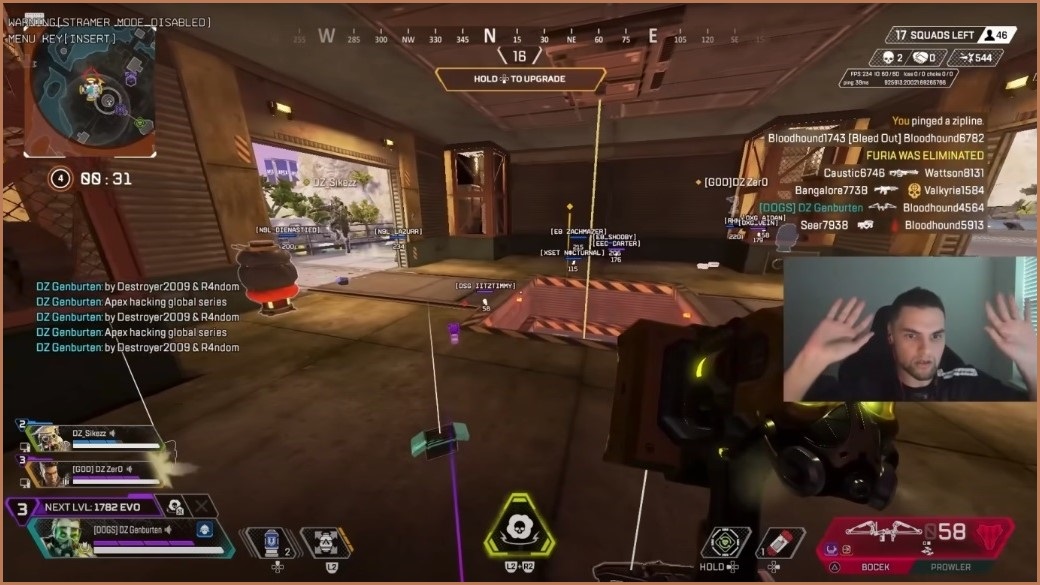A picture captured the moment a player reacted in shock to the unexpected interruption of the game. Photo: YouTube/Apex
While experts are concerned over potential election interferences, sports fans are dealing with a separate issue. An in-game cheat forced an abrupt halt at one of the world’s biggest esports competitions, furthering existing fears about sports being targeted by hackers, particularly online.
During an intense Apex Legends Global Series match – where competitors vie for their cut of a $7.7 million ($US5 million) prize pool – two players were granted abnormal skills due to sudden cheating.
A video shows a player’s shocked reaction when the competition was disrupted. A new pop-up named ‘TSM HALAL HOOK’ showcased settings that allow for cheating – strictly forbidden in such competitions.
Oddly, as the cheat then gave the player the power to see competitors through walls, the in-game chatbot concurrently displayed a note saying ‘Apex hacking global series, by Destroyer2009 &R4andom’ – hinting that an external party had hacked the game.
The event’s organizers had to pause the finals, stating in a post on X that the integrity of the series was undermined.
Epic Games owned the Easy Anti-Cheat technology, which was in-built into Apex Legends and is being used by other games like Fortnite, Ghost Recon Wildlands, Squad, etc., for preventing game manipulation. They quickly denied allegations of a coding mistake, which allowed an intruder to interfere with the game competition.
The observers’ feedback showed worries of a loophole in Apex Legends that could present their computers to cyber threats. Some suggested hosting games on standalone local networks unconnected to the internet, similar to older practices.
Accordingly, Destroyer2009 told TechCrunch that the hacks were done merely for amusement and exploited the game’s vulnerability. However, he declined to provide more details, saying he was waiting for Respawn, the game developers, to fix the issue.
He added that he did not report the issue to the companies as Electronic Arts, the publisher, doesn’t have a bug reward program to pay hackers who discover weak points in their coding.
Hacking threatening sports competitions
The hacking of an esports tournament – making the games liable to manipulation, not just the betting, operational, and related systems linked to an event – indicates the susceptibility of the global esports market. The industry is expected to be valued at $6.6 billion ($US4.3 billion) this year, with $3.8 billion ($US2.5 billion) linked to esports betting.
This incident is just the latest development in a grander narrative as hackers and cybercriminals leverage high-profile events to maximize disruption, con attendees and organizers, and influence competition outcomes.
A Microsoft report last year cautioned about intricate threats to a complex combination of IT systems and environments at sporting events and venues. These areas “contain hundreds of known and unknown vulnerabilities” for threat actors to target business-critical services and private information.
Microsoft stated, based on their experiences in securing the 2022 FIFA World Cup, managing the threat requires continuous vigilance and cooperation among stakeholders to prevent and limit escalation risks in the $920 billion ($US600 billion) international sports market.
With US basketball fans preparing for the upcoming three-week long ‘March Madness,’ 68 team college basketball finals, there are warnings that AI-led hacking could heighten attacks on office betting pools, bookies, and parties exposed to prospective cyber-crime – an apt pick-and-roll opportunity for cybercriminals.
The use of AI tools by criminals and scammers for nefarious intentions, such as a recent scam involving the false Instagram account of Formula One driver, Lewis Hamilton, is already proven. Believing the account as legit, a woman fan engaged in conversation with the scammer and was coaxed to buy a ‘fan card’ for $2,300 ($US1500) through an AI-generated audio recording. Although she declined, the incident demonstrated the escalating misuse of AI to con innocent sports fans.
